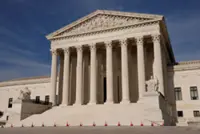NEW YORK, May 31 (Xinhua) -- U.S. stocks ended lower Wednesday as investors waited for a House vote on the debt ceiling deal to avert a potential default.
The Dow Jones Industrial Average fell 134.51 points, or 0.41 percent, to 32,908.27. The S&P 500 decreased 25.69 points, or 0.61 percent, to 4,179.83. The Nasdaq Composite Index shed 82.14 points, or 0.63 percent, to 12,935.28.





